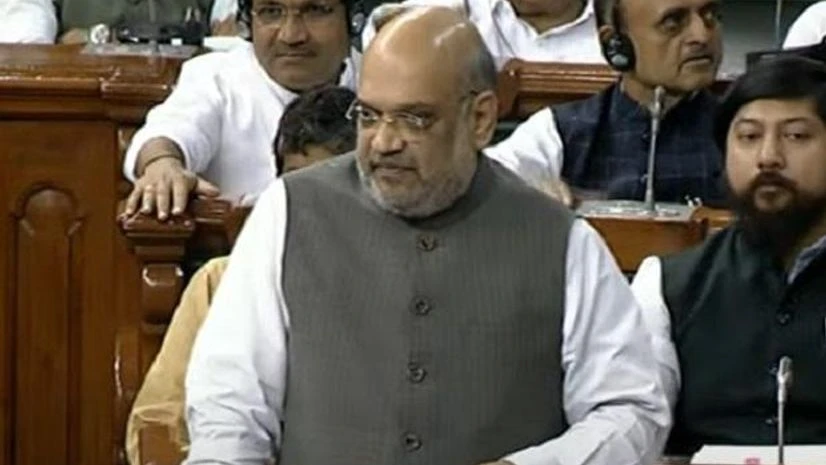Stressing that organised and coordinated cyber attacks have profound national security implications, Union Home Minister Amit Shah Saturday directed the formation of a committee headed by home secretary to evolve a strategy to tackle the menace, officials said.
Shah issued the direction during the meeting of the Northern Zonal Council held in Jaipur where attendees -- including chief ministers and lieutenant governors -- expressed concern over cyber crime and emphasised the need to make an effective strategy to deal with it.
The council comprises Haryana, Himachal Pradesh, Jammu and Kashmir, Punjab, Rajasthan, National Capital Territory of Delhi and Union Territory of Chandigarh.
The regional councils provide a forum for discussion in a structured manner on issues affecting one or more states or issues between the Centre and the states.
The home minister said zonal councils are important forum for achieving amicable settlement of interstate issues and enhancing regional cooperation between states.
Also Read
Shah said organised and coordinated cyber attacks have a profound impact on national security, public system and economic activities, and there was a need for all to work together to ensure security of national cyberspace and overall civil security.
He called for a strict action against cyber criminals in various hotspots of through better coordination among central and state security agencies.
"The Northern Zonal Council discussed the growing threat of cybercrime and held a discussion on strategies for its prevention. The Home Minister stressed upon the states and Union Territories to conduct awareness campaigns on cyber-vigilance through various mediums," an official release said.
Rajasthan Chief Minister Ashok Gehlot raised the issue of granting national project status to the state's ambitious East Rajasthan Canal Project (ERCP).
Shah advised the central and state government agencies to use common software developed by the union ministry of home affairs, work together to identify the issues of concern and trace the offenders and take strict action against them.
"In this context, it was decided that a committee under the chairmanship of the Union Home Secretary with all the concerned departments and state governments would prepare a strategy to tackle the growing menace of cyber crime," the release said.
Shah also stressed on the need to train police officers, public prosecutors, telcom companies and their PoS agents with new technology and advanced skills. He called for the maximum use of IT tools to detect cyber crimes and take systematic measures to prevent their recurrence.
The sharing of river water among member states was also discussed in the meeting with Punjab and Haryana raising the Sutlej Yamuna Link canal issue. Shah asked the states concerned to take an amicable approach and find a time-bound solution.
There are five zonal councils in the country which were set up in 1957 under Section 15-22 of the States Reorganisation Act, 1956.
"All the stakeholders should come together to establish a strong cooperative mechanism for development. The regional councils were created for this purpose," Shah said.
He said that more than 75 percent of the issues in the council have been resolved through consensus in three years of his experience.
"A very good process has started and we all should continue with it, we are moving towards achieving 100 per cent results on issues of national consensus," he said.
A total of 47 issues were discussed in the 30th meeting of the council out of these four were identified as important topics of national level.
"Out of these 47 issues, 35 issues were resolved. This shows the resolve of the Government led by Narendra Modi and its commitment towards all-round development of the country with the spirit of federalism," the release said.
"It has been the emphasis of Prime Minister Narendra Modi that the meetings of the zonal councils should be regular, result-oriented and successful in finding solutions to the pending issues" the release added.
Other issues discussed in the meeting included improving banking services in rural areas, monitoring cases of rape and sexual offenses against women and children, setting up fast-track courts for such cases and implementing the Direct Benefit Transfer (DBT).
The meeting was attended by the chief ministers of Rajasthan (Ashok Gehlot), Haryana (Manohar Lal Khattar), and Himachal Pradesh (Jai Ram Thakur); the Lt Governors of Delhi (Vinai Kumar Saxena), and Ladakh (Radha Krishna Mathur); and Administrator of Chandigarh Banwarilal Purohit.
Delhi's Deputy Chief Minister Manish Sisodia Punjab Finance Minister Harpal Singh Cheema and senior ministers of the member states also attended the meeting.
(Only the headline and picture of this report may have been reworked by the Business Standard staff; the rest of the content is auto-generated from a syndicated feed.)

)
